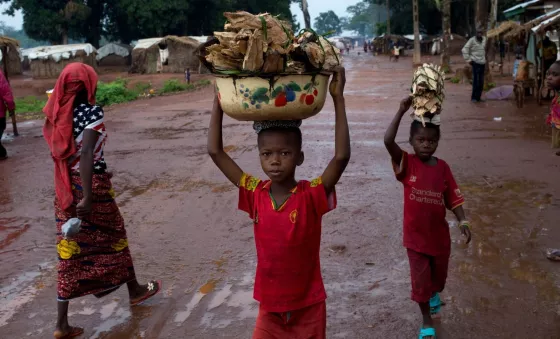In 2018 we launched our Learn to Live appeal, raising money to deliver a new psychosocial support programme for children in the Central African Republic (CAR) whose lives are being disrupted and devastated by conflict.
All donations made to the appeal were matched – pound for pound – by the UK government as part of the UK Aid Match initiative. Thanks to the generosity of our incredible supporters, we were able to make this goal a reality. Now, three years on, we wanted you to know how your support continues to save lives.
In CAR the political and security situation is extremely volatile. Ongoing clashes between armed groups continues to internally displace communities.
During such a formative time in their cognitive and social development, war disrupts children’s ability to attend school, to build social relationships with their peers and have a healthy relationship with their parents. This can have a huge impact on their mental wellbeing – leading to extreme feelings of fear, isolation, and hopelessness.
War Child identified that the key issues affecting vulnerable children were:
- Poor psychosocial wellbeing because of exposure to conflict and poverty – we estimated that around 50% of the target population in CAR had moderate-severe levels of psychosocial distress, with children struggling to recover.
- Children overwhelmed by the problems they faced – children face serious protection violations such as recruitment and use by armed groups, sexual exploitation, and other abuses; yet have limited pathways to report these issues or access help. Around 50% of children did not know who to talk to when faced with a child protection problem.
With your support, our local staff were able to focus on early and expert intervention to help children through these issues.
This included teaching them positive coping mechanisms and life skills through group activities, offering them educational and livelihoods support, as well as providing one-to-one care for those in need of additional psychosocial support and supportive listening.
In addition to this, we focused on resilience-building work with children, training and capacity-building of teachers, and child protection training within communities to help children regain their childhood, return to school, and build a safer, happier, and more hopeful future.
We have made incredible progress. With your donations which were matched by the UK government we’ve seen the following results:
- Over 55% of children we’ve been working with are now reporting that they feel safer in their communities
- We’ve implemented 10 pioneering Community-Designed Psychosocial Response initiatives, informed by the needs expressed by children and youth themselves
- Over 83% of schools we worked with demonstrated improvements across many emotional and psychosocial components

